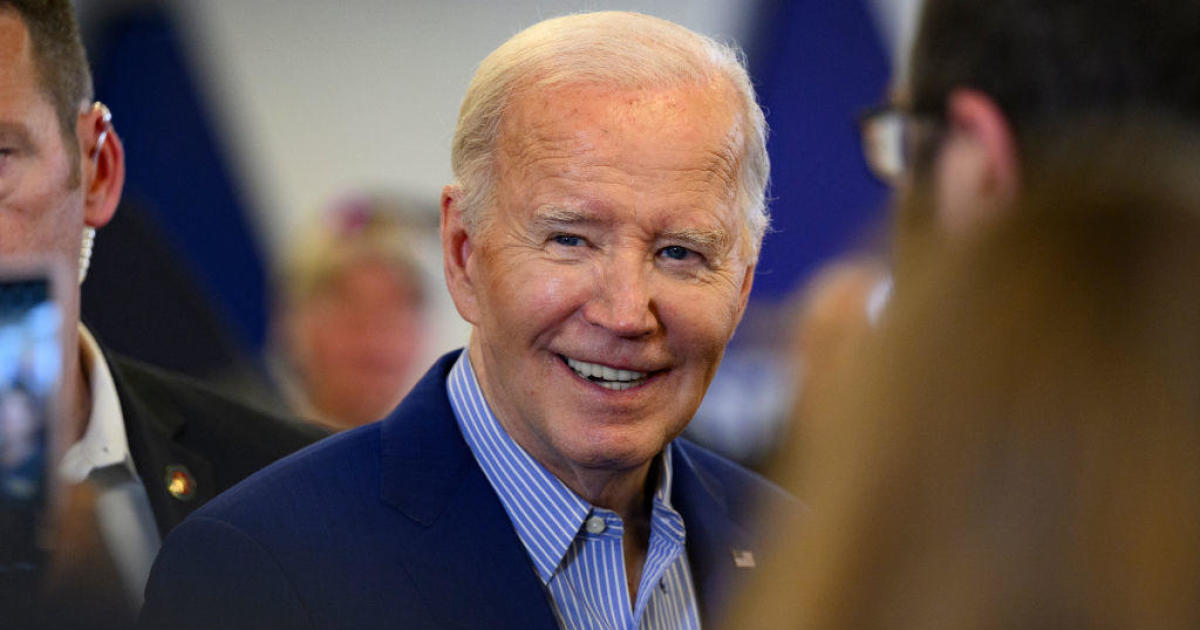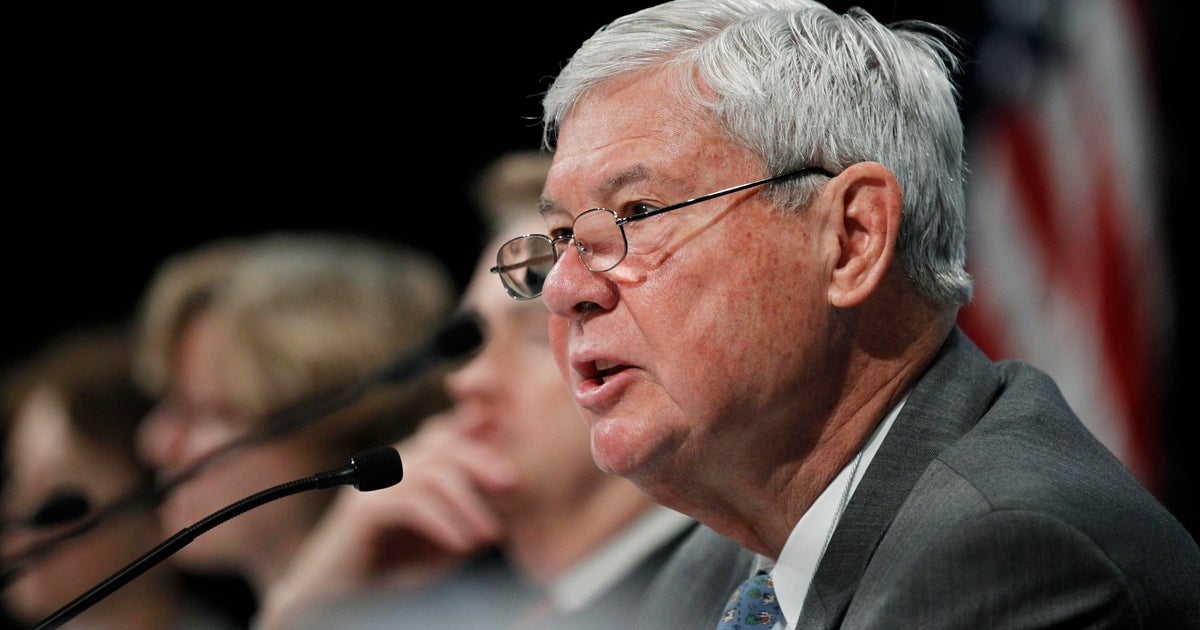Rubio: Clinton More Likely To Mishandle Classified Info Than Trump Uses Nukes
Follow CBSMIAMI.COM: Facebook | Twitter
(On October 30, 2016, U.S. Senator Marco Rubio appeared on CBS4's Facing South Florida and was interviewed by host Jim DeFede. The following is a transcript of that interview.)
DEFEDE: We are joined live here in the studio by Senator Marco Rubio, who is in his own stressful campaign against Democrat Patrick Murphy for the US Senate. Senator thank you for coming in.
RUBIO: I'm not that stressed out.
DEFEDE: Is it a stressful race?
RUBIO: It's an election. Stressful elections are the ones in other countries where the loser dies or you go to jail or you go into exile. In America, you know. So I'm not stressed. Obviously it's a lot of work to do and you want to know what the outcome is. And you want to win like anything else because it's important but we keep it in perspective.
DEFEDE: That's a good thing. I want to start with the news that broke on Friday when FBI Director James Comey sent a letter to members of Congress saying they were reviewing new emails they had discovered. I wanted to start by asking you this, was James Comey right, was the FBI director right, in releasing that information, in making it public, given the fact it was 11 days before the election and he doesn't know what's in those emails. They could just be duplicates.
RUBIO: I want to make two points about this. The first is just remember that about two months ago the Democrats were praising James Comey and the FBI – by the way James Comey, I never criticized him after he made his first announcement because I always found him to be a very professional operative, somebody that works very hard. I deal with him quite often in my role on the Intelligence Committee and I've never had an issue with him. I always found him to be professional. The second point I want to I would make that I haven't seen made enough is, what he revealed on Friday was as a result of a direct Congressional inquiry. It was not a unilateral decision to announce it to the press. He had to respond to a Congressional inquiry. He got a direct letter from the Chairman that has oversight over his function at the FBI and he had to respond to them within a reasonable period of time. And it happened to be 11 days from an election. But he didn't go out and hold a press conference. He had to respond to a Congressional inquiry.
DEFEDE: Don't you find it troubling though that with that announcement, and not knowing the contents of what's in those emails, that it could adversely affect this election one way or the other. Why should this information – how does a voter process this information?
RUBIO: Well that's the issue right. We've never had a presidential candidate, 11 or 10 days before the election, suddenly once again being scrutinized by the Federal Bureau of Investigation. And this is a pattern when it comes to Hillary Clinton. I mean this is not new, this goes back for years. It's constant and I think that's a big issue that has to be on the minds of voters now. What if this thing goes south, what if in fact the investigation turns up evidence of wrongdoing that implicates her or people near her
DEFEDE: But we are not going to know that before Election Day.
RUBIO: I understand. And it's less than ideal. But this is what you get when you nominate someone for president who is always surrounded by scandal and it's one of the reasons I continue to ask: How can Patrick Murphy, my opponent, continue to say that he trusts her 100 percent. I've said all along that in this race it's a choice between two far from perfect candidates and I have real concerns about both of them, including Secretary Clinton because of exactly these sorts of things.
DEFEDE: I want to raise the issue of Donald Trump with you, as you know that's been Patrick Murphy's main argument against you.
RUBIO: It's been his only argument against me.
DEFEDE: And I guess I want to phrase it this way: Do you understand why it is difficult for some people to comprehend how you can at one point say you do not trust Donald Trump with the nuclear codes yet at the same time say you are going to vote for him? Of everything else there just seems to be – that is the most disconnect that I think people feel.
RUBIO: But here is the reality in the real world outside of people that are partisans and therefore lined up with one party or another – and I told this story the other day. The day I had a debate I went to my dry cleaner shop to pick up my shirt, there were five people picking up their clothes as well, and they all said the same thing: "We don't know who to vote for. We don't like either one of them. What do we do?" Millions of people are in this position. My view, and I'm not saying it was an easy situation, what I am saying is I looked at and said, Okay, I have deep concerns about him, I disagree with him on a lot of things. I have deep concerns about her, I disagree with her on virtually everything, and so you have to make that choice.
DEFEDE: But you're not concerned, but you're not concerned that she might do something that might get us all blown up in a nuclear holocaust and if you say you don't trust Donald Trump with the nuclear launch codes, then you are saying you don't trust him with the nuclear launch codes.
RUBIO: Well I have deep concerns about her handling of classified information, which in fact in the real daily, on a daily basis is actually much likelier than either one of these two people starting a nuclear war. What's likelier is she would mishandle classified information or in her pattern of secrecy she would create a governmental scandal that would create incredible uncertainty in our country as you are seeing now in this campaign. Imagine now if two months into her presidency Hillary Clinton is indicted, the kind of trauma that would put our country through. So these are the sorts of things about both of these candidates that are concerning and it goes back to the point I've been making since I changed my mind and decided to run again. No matter which one of these candidates win, you are going to have to have a senator willing to stand up to them. And who is willing to acknowledge both of these candidates come with flaws.
DEFEDE: I want to go to health care. Because this is going to become a major issue with regard to what's happening with Obamacare in the future and the rest of it. I want to understand and drill a little deeper what you would replace Obamacare with.
RUBIO: Right, absolutely.
DEFEDE: So tell me exactly what you would replace it with.
RUBIO: Right now let me tell you I don't want to go back to the old system. That didn't work either. I want to have a system that is driven by the consumer, you and I and the people that purchase health insurance would be in charge of that decision because the market place would have to respond to the consumer instead of the consumer to the market place. The way you do that is you put people in charge of their healthcare money. One way people could get health insurance is the way they get it now, through their employer. The other is an employer could say to you we don't provide health insurance but we do provide health coverage money, you can only use it for health insurance but it's tax free, today it would not be, it's treated as income. And they could give you the six or eight hundred dollars a month and you would be able to go out into a national marketplace and purchase the kind of insurance you want, meaning you don't have to have full coverage. If you are young and you are healthy you may want to purchase catastrophic hospitalization and fully fund a health savings plan. The other, if you don't have that, then you would have a refundable tax credit that would apply toward both your income tax, and if you don't have an income tax liability, your payroll tax. The point is every American would now control health care spending and they could use it to purchase coverage from any company in America.
DEFEDE: So you would not require people to buy health insurance?
RUBIO: I would not.
DEFEDE: So explain to me what happens then – I'm young; I'm feeling good about myself, I don't buy health insurance…
RUBIO: But you would…
DEFEDE: Wait, wait a second, I don't buy health insurance. I end up with a catastrophic illness or I end up in a horrific accident that ends up putting me in the hospital, at Jackson Memorial Hospital. If I don't have health insurance then Jackson and the taxpayers are going to have to pick up the costs.
RUBIO: But here's the thing…
DEFEDE: Which is what the old system was.
RUBIO: Right. But here's the thing, because of the way I'm talking about it, whether it's the health coverage provided by your employer or the money that's provided to you that can only be spent on healthcare, few people will make that choice because they are basically walking away from money. You are basically walking away from either a tax credit or employer-provided healthcare money that can only be used for health care.
DEFEDE: But answer the portion that says if you don't mandate it, which was a cornerstone of Obamacare, which was we were going to mandate that people have insurance, for that very reason so that everyone is required to be covered so that taxpayers don't ultimately pay the bill.
RUBIO: But Obamacare doesn't solve that problem because most of the Obamacare exchange plans have massive deductibles. I was speaking to a lady yesterday whose son suffers, is on the autism spectrum, her deductible is five, six-thousand dollars a year. She doesn't have five thousand dollars so basically her coverage doesn't even kick in until she can come up with five thousand. The difference here is you would have people who would have health care money; they would not walk away from it. Why would you walk away $600 or $500 a month that you could at a minimum put in a health savings account that the provider could go for.
DEFEDE: How much would the tax credit portion that you are talking about, how much would that cost?
RUBIO: Well it would be income sensitive but ultimately the tax credit would be based on how much you earn.
DEFEDE: But how much would it cost? How much would it end up costing taxpayers?
RUBIO: Well, it depends on what you set the number at. Obviously per market and per region it's going to be different.
DEFEDE: But it is going to cost more than…
RUBIO: It would not cost more than the exchanges, absolutely not. Because the consumer would have a choice between…you now have a private market place that is competing for your business the way you have in the auto insurance industry. And in order to compete for your business they have to compete on pricing and on quality. It would also by the way…a lot of younger people are going to put that money in a health savings account to pay out-of-pocket for health charges.
DEFEDE: And I just want to go back, you favor a system, to go back to a system that would allow insurance companies to discriminate against people with pre-existing conditions.
RUBIO: No I don't. I think you can deal with the pre-existing condition problem separately.
DEFEDE: But insurance companies wouldn't be required to cover a person, correct?
RUBIO: Well I would – in the national marketplace it would be mandate free but here's the point: that is where we can have a high-risk pool. That is where government can actually help, is you go in and you do through government insure the people who are chronically ill and uninsurable and that would have two effects. The first is it would find coverage for people who can't find insurance and the second thing it would do is actually lower premiums because you are now removing from the marketplace your sickest patients who now have coverage but whose conditions are driving up premiums for everybody else.
DEFEDE: But the cost of that high risk pool…
RUBIO: Would be significantly less than what Obamacare is now, absolutely.
DEFEDE: That's not – most of the studies I've seen say that it is going to be exceptionally high to create a risk pool with those individuals in it that government would be on the hook for.
RUBIO: No it would still be substantially less than what Obamacare has now, but again I think that is what government should focus on and not the other portions of it which is an entire takeover.
DEFEDE: Let's take a break here and up next more with Senator Marco Rubio.
(Return with video of Hillary Clinton on stage with Jennifer Lopez during a concert the night before at Miami's Bayfront Park.)
DEFEDE: That was Hillary Clinton with Jennifer Lopez last night at Bayfront Park, no concerts for you? Were you at the concert last night?
RUBIO: (laughing) No I was at an honor flight we had a bunch of veterans from World War II, a couple from Korea that came back from one of those honor flights.
DEFEDE: Are we getting Pitbull? Will we see a Pitbull concert for you? Something? What are we going to do?
RUBIO: No Armando, Pitbull is going to stay out of politics for now – that's a good thing.
DEFEDE: All right. Let me ask you some more questions. What's your position on TPP - the Trans Pacific Partnership? Are you going to vote for it if it comes up?
RUBIO: Well this current deal is one that concerns me but let me tell you in general I would love for us to have a free trade agreement with the Asia-Pacific region. The issue with TPP, this current agreement is twofold. Number one on biologics, it lowers basically the exclusivity time down to six or eight years. That's problematic because a lot of our cures are going to come from biologics. So a lot of the pharmaceuticals may decide not to invest in a biologic if they only have a six-year patent period and that's problematic. That's the first issue. I also have a concern about its impact on auto manufacturing. And I'm also really concerned when I looked at the numbers of employment creation because I really thought opening it up to services would make it bigger. My concern is this is a massive deal and you can only do it once.
DEFEDE: So I want to be clear, the deal as it currently stands you vote no or you vote yes?
RUBIO: As it currently stands I probably could not support it.
DEFEDE: So you vote no.
RUBIO: Hopefully we can try to renegotiate some of those portions, by the way Japan is asking for a few items to be changes as well. It's a massive deal. Understand these are multiple countries; nothing like this has never been pulled off before.
DEFEDE: If Hillary Clinton is elected president and the Senate has a chance to confirm Merrick Garland, would you give Merrick Garland for the Supreme Court a new hearing, a new opportunity?
RUBIO: Well first off I'm not on the Judiciary Committee so I can't make that decision. But I will tell you that Merrick Garland, from what I know, seems to be a very decent man, well-educated, ideologically competent, but does not fulfill the criteria I want to see in a Supreme Court justice which is someone with a track record that proves that he understands his job or her job is to apply the Constitution as originally intended not as a living and breathing document which is what many on the left is. So if she nominates somebody who fits that criteria I'll be more than happy to support them. If she doesn't, or Donald Trump doesn't, I'll oppose that nominee.
DEFEDE: I want to ask about another judicial appointment that you initially supported and then you turned around and blocked and he ended up withdrawing – Judge William Thomas. Do you regret how you handled that?
RUBIO: No. First of all I never supported his nomination. He came out of the JNC (Judicial Nominating Committee) process that we have, whose job it is to review his file…
DEFEDE: You didn't…
RUBIO: I did not.
DEFEDE: It could not have moved forward unless you signed off on it.
RUBIO: No. But first of all we found out - since the time he came out of the JNC we learned about the way he handled a couple of murder cases; a murder case in particular involving a young lady here in South Florida. I was deeply concerned about that. We also learned about the way he handled a DUI case. I was concerned about that.
DEFEDE: But the prosecutor in that case, the DUI case, even came forward and said his rulings were all fair.
RUBIO: But here's the truth. A lot of these lawyers that were once prosecutors are now lawyers appearing before these judges and they all want to be in good graces with all the other judges so they come forward and say these things publicly and then privately you have these lawyers calling you and saying I have concerns about this judge but please don't make it public because I still have cases before the court and I don't want to be looked at badly by other judges.
DEFEDE: But isn't this one of the reasons why it's so hard to get any appointments passed?
RUBIO: He was replaced by another judge who is a fantastic judge, now on the bench, sitting there and functioning. So it's not a vacancy that's left unfilled. Judge Thomas was not the kind of jurist I believe should be on the court. The way he handled the murder case of this young lady from South Miami, went to high school with my nephews I had deep concerns about the way he handled evidence, especially early in that case.
DEFEDE: They were ultimately convicted.
RUBIO: They were but the process was more painful than it needed to be for the family. He did everything possible to try and skew in the direction of the victim...uh, uh, the perpetrator early on. He's just not the kind of judge that should be put in a lifetime position. And the White House withdrew his nomination, replaced him with a new nomination, that judge is now sitting on the federal bench.
DEFEDE: Well they withdrew after he was left hanging because you…
RUBIO: He was not left hanging. I told him he wasn't moving forward, there was no hanging there. It was not going to happen. And I was very clear with the White House about that.
DEFEDE: We have very little time; I just want to bring up Syria though. You voted against air strikes in 2013.
RUBIO: Absolutely.
DEFEDE: Was that vote a mistake?
RUBIO: No because the President's proposal was to go in and take symbolic action and send a message to Assad. That is not the use of the United States military. Beyond it, I never felt, even to this day, do not feel that a full-scale US military intervention against the Assad regime is the right way forward. I believed at the time and continue to that the best approach for us would have been to empower elements on the ground. I actually felt and I said it that air strikes against Assad would have been counter-productive. He would have survived the air strikes, he would have emerged from them stronger, and he would have rallied people in the region to his side.
DEFEDE: Should there be US ground troops in Syria?
RUBIO: Not at this time; absolutely not. I don't think that would be productive.
DEFEDE: Should US policy be to remove Assad?
RUBIO: Absolutely, and I think the way you do it is you empower Syrians to remove him from power not American troops on the ground which would be counter-productive. Even our allies in Syria do not want American ground troops there.
DEFEDE: You had said during the debate that the President said that these were pinpricks – these air strikes. That's not what he said.
RUBIO: Well that's exactly how John Kerry described it, that's exactly what…
DEFEDE: But that's not what the President said.
RUBIO: Well that's how his administration said it. They were not going in to remove – those air strikes were not to remove Assad. The air strikes - what they were going to hit in a small-scale attack to send a message that this is the consequence for what you did with chemical weapons but it wouldn't have eroded his capabilities and in my view they would have strengthened him. It would have forced Arab countries in the region to rally to his side because in the Arab street, even in the capitals of some of our allies, American intervention in the region is not popular and it would have strengthened Assad. I made all these arguments at the time when I voted against it and I was right.
DEFEDE: Senator Rubio I appreciate your coming in. Just nine days left, you feeling good about it?
RUBIO: Yes I am but we have a lot of work to do. Nine days is a long time, this year especially.



